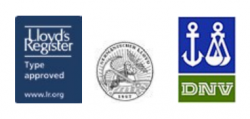
Marine approval is essential for reliable operation of sensors in harsh maritime conditions. This guide details the process, highlights crucial selection criteria, and explores diverse applications of certified sensors in various shipboard systems, from ballast control to cargo management.
All voyage and safety critical equipment on a ship must be certified by the same marine approval body that audited and registered the whole ship. The marine approval process involves an initial and continuous periodic product assessment to inspect random production samples, ensure adequate production and inspection processes, procedures, documentation and quality control, and review the current product design and any future design iterations for compliance with the type approval.
- Marine approval ensures equipment reliability in harsh maritime conditions.
- Classification societies like LR, DNV, and ABS conduct rigorous testing and certification.
- Sensor selection requires considering material compatibility, vibration resistance, and specific application needs.
- Marine-approved sensors are crucial for voyage and safety-critical systems.
- Ongoing surveillance maintains certification and ensures consistent product quality.
Pressure and level sensors that have been approved for marine use on ships and other offshore applications. Select a sensor for measuring sea water ballast, liquid cargo, fuel and wastewater pressures & levels.
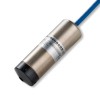 Marine Approved Liquid Level Sensors - Explore marine-approved liquid level sensors certified (DNV, ABS, LR) for reliable measurement in harsh shipboard and offshore environments. Robust designs for ballast, fuel, bilge & service tanks.
Marine Approved Liquid Level Sensors - Explore marine-approved liquid level sensors certified (DNV, ABS, LR) for reliable measurement in harsh shipboard and offshore environments. Robust designs for ballast, fuel, bilge & service tanks.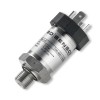 Marine Approved Pressure Transmitters - Marine approved pressure transmitters with 4-20mA output for critical ship management systems including engines, cargo tanks, ballast control, and fuel gauging. ATEX options available.
Marine Approved Pressure Transmitters - Marine approved pressure transmitters with 4-20mA output for critical ship management systems including engines, cargo tanks, ballast control, and fuel gauging. ATEX options available.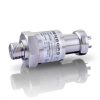 Sea Water Resistant Ship Use Certified Pressure Transmitters - These pressure transmitters are specifically engineered to handle the harsh conditions found in shipboard and marine environments. Constructed with corrosion-resistant wetted parts suitable for seawater and certified for marine use
Sea Water Resistant Ship Use Certified Pressure Transmitters - These pressure transmitters are specifically engineered to handle the harsh conditions found in shipboard and marine environments. Constructed with corrosion-resistant wetted parts suitable for seawater and certified for marine use Marine Approved Hydrostatic Liquid Level Sensors - Marine approved hydrostatic liquid level sensors provide accurate and reliable level measurement of seawater ballast, diesel fuel, wastewater, and liquid cargo in harsh marine environments.
Marine Approved Hydrostatic Liquid Level Sensors - Marine approved hydrostatic liquid level sensors provide accurate and reliable level measurement of seawater ballast, diesel fuel, wastewater, and liquid cargo in harsh marine environments. Marine Approved Submersible Liquid Level Sensors - Marine approved submersible liquid level sensors are essential for monitoring liquid levels in various onboard applications.
Marine Approved Submersible Liquid Level Sensors - Marine approved submersible liquid level sensors are essential for monitoring liquid levels in various onboard applications.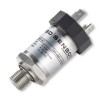 Ship Use Certified Pressure Transmitters - Marine certified 4-20mA pressure transmitters are essential for monitoring critical systems on ships. Approved by classification societies like Lloyd's Register and DNV to ensure reliability in demanding marine environments.
Ship Use Certified Pressure Transmitters - Marine certified 4-20mA pressure transmitters are essential for monitoring critical systems on ships. Approved by classification societies like Lloyd's Register and DNV to ensure reliability in demanding marine environments.
The Importance of Marine Approvals
Marine environments present unique challenges for electronic equipment. Saltwater corrosion, vibration, electromagnetic interference, and extreme temperature fluctuations demand robust and reliable instrumentation. Marine approval signifies that a product has undergone rigorous testing and certification by a recognized maritime classification society, ensuring its suitability for shipboard use. This certification isn’t a one-time event; it involves ongoing surveillance of the manufacturing process and product design to maintain compliance.
Navigating the Marine Approval Process
Marine approvals are crucial for any equipment considered voyage or safety critical. This includes systems like navigation, communication, propulsion, and ballast control. The specific approval body such as LR (Lloyd’s Register), GL (Germanischer Lloyd), DNV (Det Norske Veritas), ABS (American Bureau of Shipping),CCS (China Classification Society), BV (Bureau Veritas), or others, is often determined by the classification society that oversees the vessel itself. This ensures consistency and simplifies the overall ship certification process.
Selecting Sensors for Marine Environments
Selecting the right sensor for marine applications requires careful consideration of several factors beyond just the basic measurement parameters. For instance, when measuring ballast tank levels, the sensor must withstand not only the hydrostatic pressure but also the corrosive nature of seawater and potential for tank cleaning operations. Material compatibility with the medium being measured is paramount, as is the sensor’s resistance to vibration and shock. In fuel or cargo tank gauging, intrinsically safe (IS) or explosion-proof certifications may be necessary depending on the flammability of the liquids.
Featured marine certified products
 DMK457 Marine Approved Pressure Transmitter - Marine approved pressure transmitter with 4-20mA current loop output for shipbuilding with optional CuNiFe housing for sea-water compatibility
DMK457 Marine Approved Pressure Transmitter - Marine approved pressure transmitter with 4-20mA current loop output for shipbuilding with optional CuNiFe housing for sea-water compatibility -10…30 kPa g compound range inert gas pressure transmitter for ship IG system - An intrinsically safe, marine approved compound range pressure transmitter for ship cargo tank IG system use to measure pressure of inert gas over a range of -10 to 30 kPa g from the G1/2 male process connection, and sending the corresponding 4-20mA signal through the DIN plug electrical connection.
-10…30 kPa g compound range inert gas pressure transmitter for ship IG system - An intrinsically safe, marine approved compound range pressure transmitter for ship cargo tank IG system use to measure pressure of inert gas over a range of -10 to 30 kPa g from the G1/2 male process connection, and sending the corresponding 4-20mA signal through the DIN plug electrical connection.
Specific Application Considerations
Consider pressure and level sensors used in a ship’s wastewater system. These sensors must be resistant to the chemicals and solids present in wastewater, and must also be able to withstand the temperature variations experienced in different parts of the vessel. The sensor’s mounting method and its ease of maintenance are also important, as access to these systems can be limited. Similarly, sensors used in cargo tanks, especially for chemical tankers, need to be compatible with a wide range of potentially aggressive substances. They must also be designed to prevent leaks and ensure accurate level measurement even with varying cargo densities.
Offshore Applications
Offshore platforms and support vessels face similar environmental challenges to ships, demanding robust and reliable instrumentation. Marine approvals are equally crucial for these structures, where equipment failure can have significant consequences. Consider the diverse applications on a typical platform: buoyancy control systems rely on precise level measurement to maintain stability, while storage tanks for drilling fluids, chemicals, and produced hydrocarbons require accurate level and pressure monitoring for safe operation. Generators, vital for power supply, depend on reliable sensors for monitoring fuel levels, oil pressure, and coolant temperature. Even seemingly less critical systems like HVAC and other utilities benefit from marine-approved sensors, ensuring consistent performance and minimizing downtime. These sensors must be resistant to saltwater corrosion, vibration, and extreme temperature fluctuations, just as they are on ships. Furthermore, they need to be compatible with the specific media being measured, whether it’s drilling mud, crude oil, or specialized chemicals. Ease of maintenance and accessibility are also important factors, especially in the often-cramped and hazardous environments of offshore platforms. The specific certifications required will depend on the platform’s location, the type of operations being conducted, and the relevant regulatory bodies governing the region.
Related Application Questions and Answers
Contact us about this Marine Approval page to request more information, or to discuss your application requirements.
